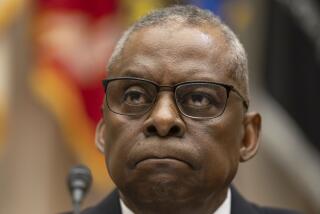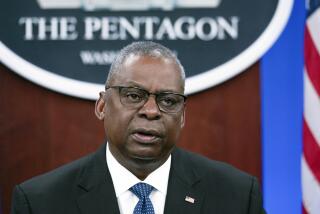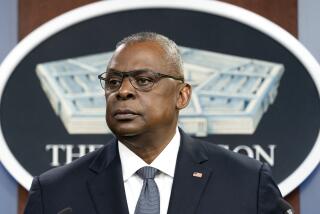Air Force’s top leaders are ousted
In an unprecedented action in a time of war, Defense Secretary Robert M. Gates simultaneously fired the civilian and military leaders of the Air Force on Thursday, saying that oversight standards for the U.S. nuclear arsenal had deteriorated on their watch.
The immediate reason for the requested resignations of Gen. T. Michael “Buzz” Moseley, the Air Force chief of staff, and Air Force Secretary Michael W. Wynne was a report on the accidental shipment of nuclear triggers to Taiwan. However, the dismissals came amid a long-brewing dispute between Gates and the Air Force leadership.
The nuclear-trigger investigation -- led by Adm. Kirkland H. Donald, the military’s senior official on nuclear safety matters -- found that the Air Force had failed to focus on its nuclear mission even after last year’s high-profile incident in which a B-52 bomber crew unknowingly flew six nuclear warheads from North Dakota to Louisiana.
“The stewardship of our nuclear deterrent is the most sensitive mission that we have,” Gates said at a Pentagon news conference. “The declining standards . . . in my view required strong action.”
Gates was particularly disappointed that the Air Force had not taken significant steps to shore up its nuclear controls after the B-52 incident, said Pentagon Press Secretary Geoff Morrell. The nuclear weapons, on cruise missiles attached to the plane’s wings, were not discovered missing from their repository at Minot Air Force Base in North Dakota for about 36 hours.
“If the Air Force had rectified this widespread cultural problem and taken the necessary corrective action after Minot, we would not be talking to you today,” Morrell said. “A change in leadership would not have been necessary.”
Gates said the dismissals were necessary because the Air Force began focusing on its nuclear problems only after the shipment to Taiwan was disclosed this year. In addition, he said, the Air Force had not been sufficiently critical of its past performance.
He acknowledged that problems in securing the nuclear arsenal go back more than a decade, but he added that the current leadership should have recognized and corrected them. He appointed a task force led by James R. Schlesinger, Defense secretary under President Ford, to recommend improvements in the oversight of nuclear weapons.
Gates said the dismissals of Wynne and Moseley were based solely on Donald’s report, which he received last week. The report is classified, but officials briefed on the findings said it was highly critical of Air Force handling of nuclear technology.
The parts shipped to Taiwan included four electrical fuses used to trigger a nuclear weapon aboard U.S. missiles. The fuses were shipped to Taiwan by the Defense Logistics Agency, but the Air Force provided the fuses.
The fuses were sent to Taiwan in 2006. The mistake went undetected until March of this year.
A senior defense official, who requested anonymity because he was not authorized to discuss personnel moves, said the Air Force’s failures in nuclear oversight were sufficient to merit the dismissals. He also acknowledged that the report was just the latest in a series of incidents that have raised questions about Air Force leadership.
Gates has been critical of Air Force officials’ calls to build more F-22 fighter jets, an advanced but expensive plane. He also has been frustrated over what he sees as insufficient deployment of unmanned aerial vehicles over Iraq and Afghanistan.
Loren Thompson, a defense policy analyst at the Lexington Institute in Arlington, Va., said although the “formal reason” for Moseley’s and Wynne’s departure was the Taiwan shipment, the forced resignations were actually the result of a growing “accumulation of grievances.”
“In the end, what it came down to is the feeling of the secretary of the Defense that the Air Force just wasn’t on the policy page he was on, that it was pursuing its own policies,” said Thompson, who is close to Air Force officials.
Officers have watched with frustration as Gates has delivered a series of speeches seen as critical of the Air Force. In their view, the service has made valuable contributions to the wars in Iraq and Afghanistan, including technology that allows ground troops to see full-motion videos shot from Predator drones.
Air Force Lt. Col. Greg Harbin, who has worked closely with Moseley and Wynne, said the two men were very much focused on Iraq and Afghanistan.
“We have not done a good job telling our story,” Harbin said. “But there should be no doubt these men were focused on the wars.”
The senior defense official said Gates had replacements for the two men in mind, but wanted to take a few days to consider the candidates.
Air Force leaders are said to favor Gen. John D.W. Corley, the head of Air Combat Command, as Moseley’s replacement. Other defense officials are supporting Gen. Norton A. Schwartz, head of Transportation Command. Schwartz, who flew C-130 cargo planes and other aircraft, is not part of the fighter-plane community that dominates the Air Force. He has extensive experience working with other services. Gen. Kevin P. Chilton, the head of Strategic Command, is seen as another possible candidate.
On Capitol Hill, Democrats praised Gates’ quick action, saying it marked a significant change from the leadership of his predecessor, Donald H. Rumsfeld.
“Secretary Gates’ focus on accountability is essential and had been absent from the office of the secretary of Defense for too long,” said Sen. Carl Levin (D-Mich.), head of the Senate Armed Services Committee.
Moseley and Wynne are the latest in a series of senior Pentagon leaders whom Gates has either forced out or failed to renominate during his 18 months at the Pentagon. Rumsfeld was widely criticized, particularly by Democrats, for not holding senior officials accountable for failures in the Iraq war.
“What we’ve discovered here is that, unlike Donald Rumsfeld, Secretary Gates has both a bark and a bite,” Thompson said.
Even before Thursday’s revelation of the damning report on nuclear weapons, Moseley’s job was thought to be in jeopardy. In addition to the public spat over the F-22 and the unmanned drones, Moseley had been under investigation by the Pentagon’s inspector general for his involvement in a $50-million contract that was improperly steered to a company with close ties to senior Air Force officials.
Sen. Claire McCaskill (D-Mo.), a member of the Armed Services Committee who led the criticism of Moseley, said investigators with whom she had spoken described the general as “evasive with his answers” during the inquiry. She said she was pleased that Gates had pushed him out.
“Any rookie auditor would have realized that they had an incredibly bad odor coming from the very top,” McCaskill, the former state auditor in Missouri, said in an interview.
In his resignation letter, Wynne said he had long been an advocate for accountability within the Pentagon, and as a result accepted his fate. Moseley’s letter, by contrast, did not mention the nuclear incident and simply stated his intention to retire.
--
peter.spiegel@latimes.com
--
(BEGIN TEXT OF INFOBOX)
High-level departures under Gates
Since taking over as Defense secretary, Robert M. Gates has rattled the Pentagon’s top leadership, removing two service secretaries and several top generals. Among them:
Francis J. Harvey, secretary of the Army
Forced to resign over the scandal at Walter Reed Army Medical Center
Lt. Gen. Kevin
C. Kiley, Army surgeon general
Forced to resign over the Walter Reed scandal
Michael W. Wynne, secretary of
the Air Force
Fired over the handling of the U.S. nuclear arsenal
Gen. T. Michael “Buzz” Moseley, Air Force chief
of staff
Fired over the handling of the U.S. nuclear arsenal
Gen. Peter Pace, chairman of Joint Chiefs of Staff
Not renominated following Senate objections
Adm. William J. Fallon, commander, U.S. Central Command
Resigned under pressure from Bush administration
More to Read
Start your day right
Sign up for Essential California for news, features and recommendations from the L.A. Times and beyond in your inbox six days a week.
You may occasionally receive promotional content from the Los Angeles Times.






